必修4 Unit 4 Body language 2021届人教版英语高考一轮复习考点精练课件 (共38张PPT)
文档属性
| 名称 | 必修4 Unit 4 Body language 2021届人教版英语高考一轮复习考点精练课件 (共38张PPT) | 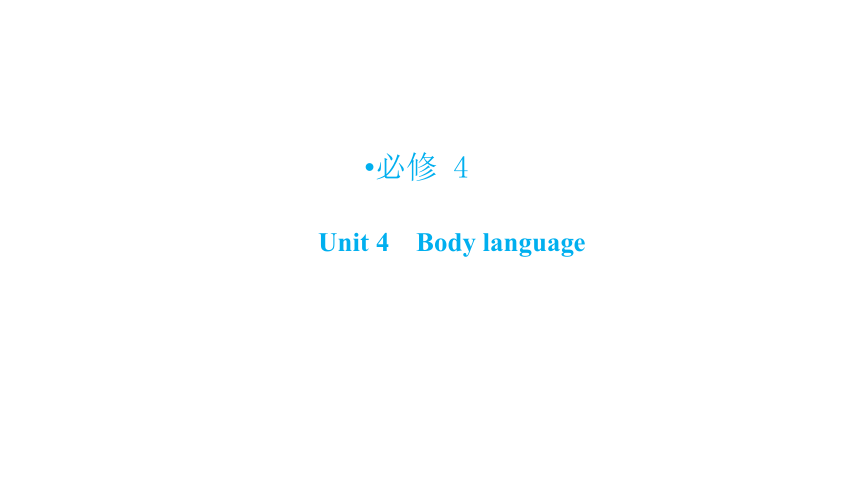 | |
| 格式 | ppt | ||
| 文件大小 | 950.0KB | ||
| 资源类型 | 教案 | ||
| 版本资源 | 人教版(新课程标准) | ||
| 科目 | 英语 | ||
| 更新时间 | 2020-11-15 17:42:15 | ||
图片预览

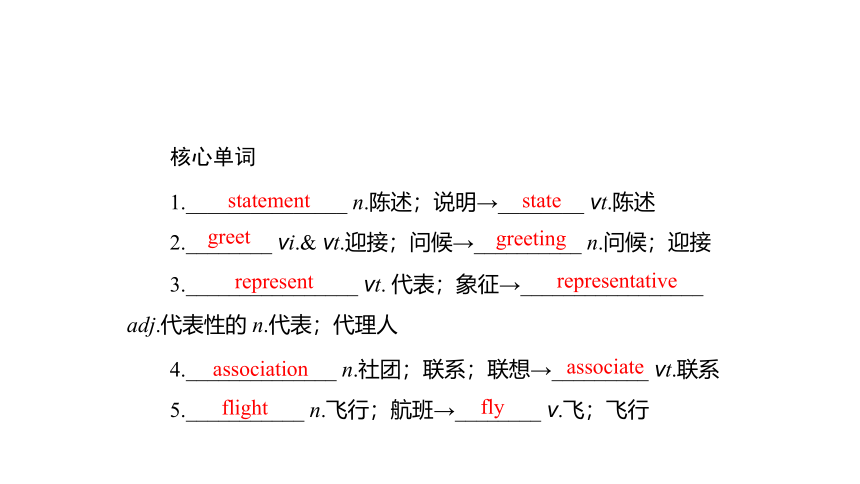
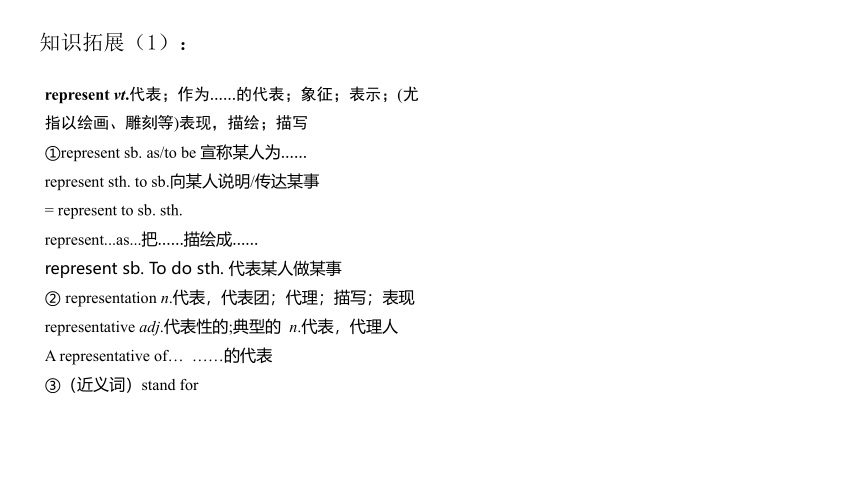
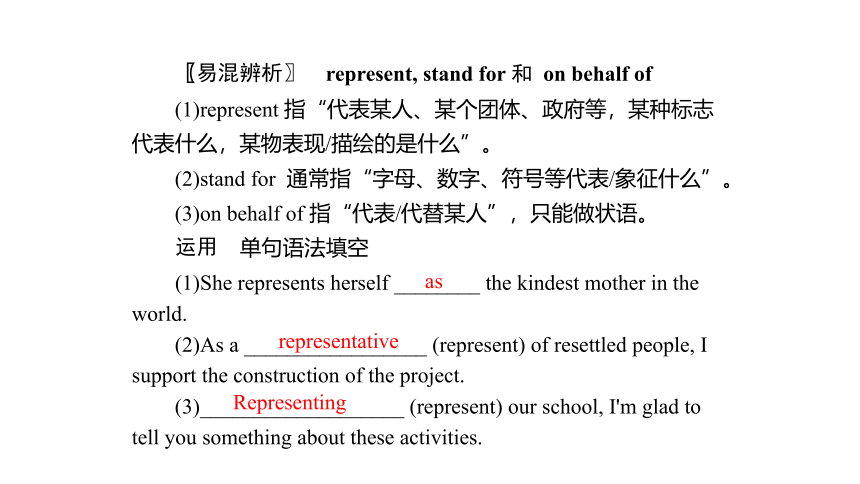
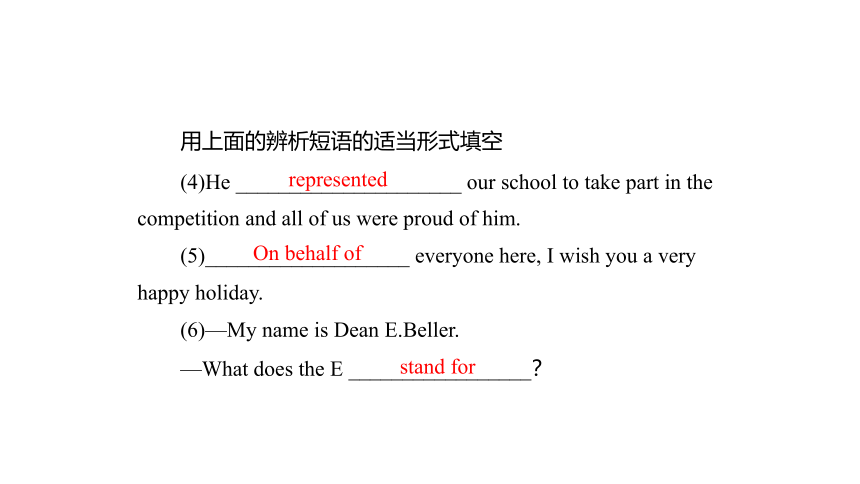
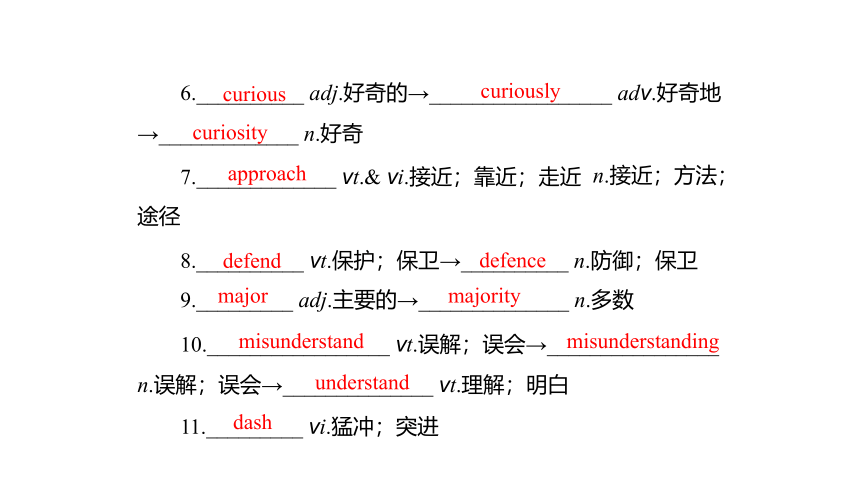
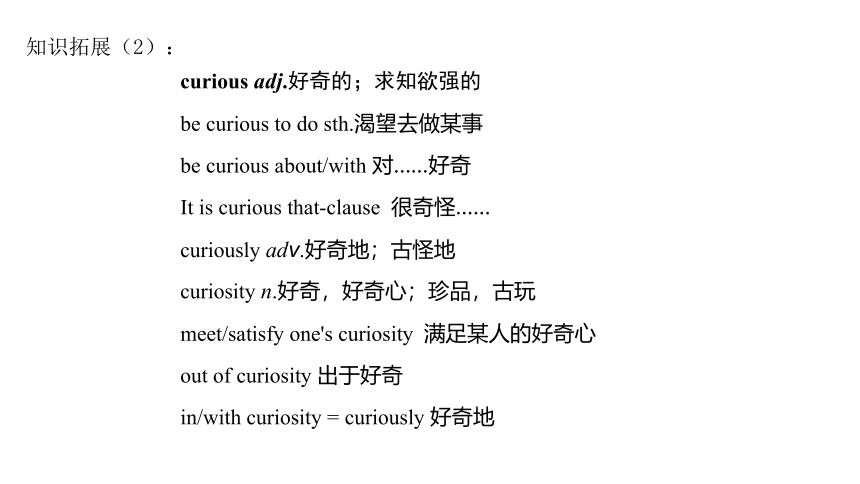

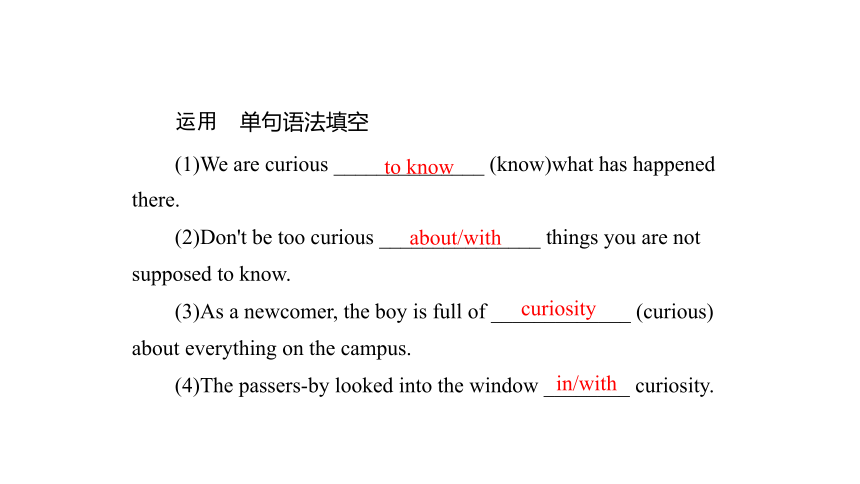
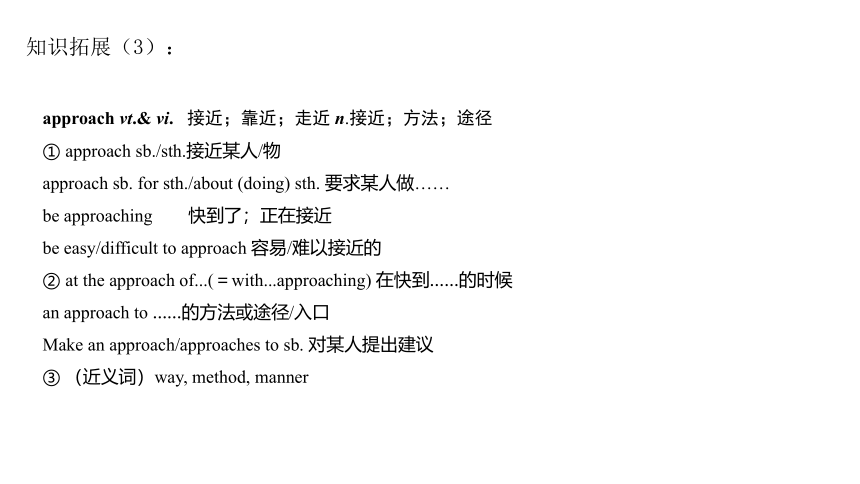

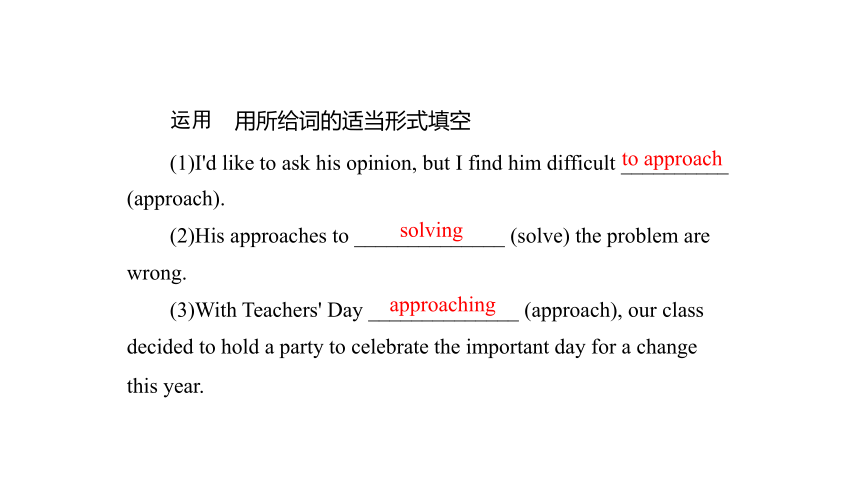
文档简介
(共38张PPT)
必修
4
Unit
4
Body
language
核心单词
statement
state
greet
greeting
1._______________
n.陈述;说明→________
vt.陈述
2.________
vi.&
vt.迎接;问候→__________
n.问候;迎接
3.________________
vt.
代表;象征→_________________
adj.代表性的
n.代表;代理人
4.______________
n.社团;联系;联想→_________
vt.联系
5.___________
n.飞行;航班→________
v.飞;飞行
represent
representative
association
associate
flight
fly
知识拓展(1):
represent
vt.代表;作为……的代表;象征;表示;(尤指以绘画、雕刻等)表现,描绘;描写
①represent
sb.
as/to
be
宣称某人为……
represent
sth.
to
sb.向某人说明/传达某事
=
represent
to
sb.
sth.
represent...as...把……描绘成……
represent
sb.
To
do
sth.
代表某人做某事
②
representation
n.代表,代表团;代理;描写;表现
representative
adj.代表性的;典型的
n.代表,代理人
A
representative
of…
……的代表
③(近义词)stand
for
〖易混辨析〗
represent,
stand
for
和
on
behalf
of
(1)represent
指“代表某人、某个团体、政府等,某种标志
代表什么,某物表现/描绘的是什么”。
(2)stand
for
通常指“字母、数字、符号等代表/象征什么”。
(3)on
behalf
of
指“代表/代替某人”,只能做状语。
运用
单句语法填空
(1)She
represents
herself
________
the
kindest
mother
in
the
world.
as
representative
Representing
(2)As
a
_________________
(represent)
of
resettled
people,
I
support
the
construction
of
the
project.
(3)___________________
(represent)
our
school,
I'm
glad
to
tell
you
something
about
these
activities.
用上面的辨析短语的适当形式填空
(4)He
_____________________
our
school
to
take
part
in
the
competition
and
all
of
us
were
proud
of
him.
(5)___________________
everyone
here,
I
wish
you
a
very
happy
holiday.
(6)—My
name
is
Dean
E.Beller.
—What
does
the
E
_________________?
represented
On
behalf
of
stand
for
6.__________
adj.好奇的→_________________
adv.好奇地
→_____________
n.好奇
curious
curiously
curiosity
7._____________
vt.&
vi.接近;靠近;走近
n.接近;方法;
途径
approach
defend
defence
major
majority
8.__________
vt.保护;保卫→__________
n.防御;保卫
9._________
adj.主要的→______________
n.多数
10._________________
vt.误解;误会→________________
n.误解;误会→______________
vt.理解;明白
11._________
vi.猛冲;突进
misunderstand
misunderstanding
understand
dash
curious
adj.好奇的;求知欲强的
be
curious
to
do
sth.渴望去做某事
be
curious
about/with
对……好奇
It
is
curious
that-clause
很奇怪……
curiously
adv.好奇地;古怪地
curiosity
n.好奇,好奇心;珍品,古玩
meet/satisfy
one's
curiosity
满足某人的好奇心
out
of
curiosity
出于好奇
in/with
curiosity
=
curiously
好奇地
知识拓展(2):
〖用法指引〗
curious
还可表示“奇怪的;不寻常的”,有时后接从句,
其谓语可以用陈述语气或虚拟语气。如:
It's
curious
that
he
should
have
asked
such
a
question.
他居然
问那样的问题,真是奇怪。
运用
单句语法填空
(1)We
are
curious
______________
(know)what
has
happened
there.
(2)Don't
be
too
curious
_______________
things
you
are
not
supposed
to
know.
(3)As
a
newcomer,
the
boy
is
full
of
_____________
(curious)
about
everything
on
the
campus.
(4)The
passers-by
looked
into
the
window
________
curiosity.
to
know
about/with
curiosity
in/with
approach
vt.&
vi.
接近;靠近;走近
n.接近;方法;途径
①
approach
sb./sth.接近某人/物
approach
sb.
for
sth./about
(doing)
sth.
要求某人做……
be
approaching
快到了;正在接近
be
easy/difficult
to
approach
容易/难以接近的
②
at
the
approach
of...(=with...approaching)
在快到……的时候
an
approach
to
……的方法或途径/入口
Make
an
approach/approaches
to
sb.
对某人提出建议
③
(近义词)way,
method,
manner
知识拓展(3):
〖易混辨析〗
approach,
way,
method
和
means
(1)approach
指待人接物或思考问题的方式、方法、态度,
除了翻译为“方法”之外,还有“接近”的意思。如:
an
approach
to
(doing)
sth.做某事的方法。
(2)way
的使用范围很广,但较多地用在具体的事情上或口
语中,一般指做某事的方法。如:the
way
to
do
sth./the
way
of
doing
sth.做某事的方法。
(3)method
指有条理的、系统的办法,特别指新的办法。如:
with
a
method
做某事的方法;the
method
of
sth.做某事的方法。
(4)means
指实现目的的任何手段,或使用某种交通工具的
方式,其单复数同形。如:by
means
of
借助于。
运用
用所给词的适当形式填空
(1)I'd
like
to
ask
his
opinion,
but
I
find
him
difficult
__________
(approach).
(2)His
approaches
to
______________
(solve)
the
problem
are
wrong.
(3)With
Teachers'
Day
______________
(approach),
our
class
decided
to
hold
a
party
to
celebrate
the
important
day
for
a
change
this
year.
to
approach
solving
approaching
defend
vt.保护;保卫;为……辩护
defend...against/from
防御或保卫……以免受……
defend
sb./oneself/sth.为某人/自己/某事辩护
defence
n.防御;保卫
in
defence
of
防御;保卫
〖写作佳句〗
All
our
officers
are
trained
to
defend
themselves
against
knife
attacks.我们的所有军官都接受了训练来保护他们自己不受到尖
刀的攻击。
知识拓展(4):
〖易混辨析〗
defend,
protect,
guard
和
preserve
这些动词都有“使安全或保持安全状态不遭受危险、攻击
或伤害”的意思。其区别如下:
(1)defend
表示“采取措施抵制进攻”。
(2)protect
常表示“提供安全的方式来驱开不适、伤害或进
攻”。
(3)guard
表示“看守”。
(4)preserve
表示“采取措施维护……的安全”。
defended
against/from
运用
完成句子,每空一词
(1)英雄们抗敌卫国。
The
heroes
__________________
__________
___________
________________
enemies.
(2)她勇敢地为言论自由辩护。
She
spoke
bravely
_______
____________
_______
freedom
of
speech.
in
defence
of
our
country
用上面的辨析词的适当形式填空
(3)The
soldiers
_________
the
prisoners.
(4)When
the
dog
attacked
me,
I
picked
up
a
stick
and
_______
myself.
(5)He
wears
sunglasses
to
_________
his
eyes
from
the
strong
sunlight.
guarded
defended
protect
12._________
n.成人;成年人
adj.成人的;成熟的
13.__________
adj.口语的→________________
adj.未说出
口的;非口语的
adult
spoken
unspoken
likely
14._________
adj.可能的
15.___________
adj.面部的→_________
n.面部;脸
vt.面
对;面向
facial
face
function
functional
vi.起作用;运转
16.______________
n.作用;功能;职能
→_______________
adj.功能的
17.________
n.安逸;舒适
vt.减轻(痛苦、忧虑)→________
adj.容易的
ease
easy
truly
true
truth
false
18._________
adv.真实地;真诚地;真正地→_________
adj.
真的→_________
n.真理
19._________
adj.错误的;假的
20._________
n.
怒
气;
怒火
→_____________
adj.
气
愤
的
→___________
adv.愤怒地
21.______________
adj.主观的→_____________
n.主语
anger
angry
angrily
subjective
subject
常考短语
1.__________...against
防御;保卫……以免受
2.be
__________
to
很可能……;有希望……
3.in
____________
总的来说;通常
4.at
_________
舒适;快活;自由自在
5._________
face
丢脸
6.turn
one's
__________
to
背对
7.(get/be)
__________
to
接近
8.as
________
(as)
也;还
9._________
away
from
不靠近
10.____________
out
当心;小心
11.be
____________
about
对……好奇
defend
likely
general
ease
lose
close
well
keep
look/watch
curious
back
知识拓展(5):
be
likely
to
很可能……;有希望……
sb./sth.
be
likely
to
do
sth.某人/某物可能做某事
It
is
likely
that...做……是可能的;
很有可能
Not
likely!
不可能!
unlikely
adj.不太可能的
(近义词)possible
〖写作佳句〗
(2018
年北京卷
·
七选五型阅读理解)
People
who
have
personality
traits
that
connect
with
competitiveness
and
low
upset
tolerance
are
much
more
likely
to
get
angry.
争强好胜的人和容忍度低的人更容易发怒。
运用
一句多译,每空一词
如果你继续吸烟,你的健康状况很有可能会不佳。
You
________
___________
________
suffer
from
bad
health
if
you
keep
smoking.
=
________
________
____________
________
you
could
suffer
from
bad
health
if
you
keep
smoking.
are
likely
to
It
is
likely
that
知识拓展(6):
in
general
总的来说;通常
as
a
general
rule
一般而言;通常
general
idea
大意,中心思想
generally
speaking
一般说来
It
is
generally
believed/acknowledged
that…人们普遍认为……
〖联想发散〗
表示“总之;总的来说”的词组有:
in
a
word
总之
as
a
whole
就整体来看;一般地说
in
short/brief
简而言之;总之
on
the
whole=to
sum
up
总的来说
at
ease
舒适;快活;自由自在
with
ease
轻易地,毫不费力地
feel/look
at
ease
感到/看上去心情放松
put/set
sb.at
one's
ease
使某人放松、松弛
take
one's
ease
休息,轻松一下
ease
one's
mind
使某人安心
ease
sb.of
sth.减轻某人的(痛苦、负担等)
〖写作佳句〗
We
live
in
an
age
when
more
information
is
available
with
greater
ease
than
ever
before.我们生活在这样的一个时代,比任
何时候更容易获得信息。
知识拓展(7):
运用
单句语法填空
at
ease
with
eased
(1)The
policemen
tried
every
possible
means
to
put
the
missing
child
________
ease.
(2)Don't
overwork
yourself
and
take
your
________
(easy).
(3)The
girl
answered
all
the
questions
________
great
ease.
(4)The
news
that
her
son
was
safe
_________
(easy)
her
mind.
lose
face
丢脸
make
a
face
做鬼脸
save
one's
face
挽回面子
in
(the)
face
of
面对(问题、困难、危险等)
face
to
face
面对面
be
faced
with
面对
〖联想发散〗
结构为“lose+名词”的固定搭配有:
lose
heart
失去勇气;丧失信心
lose
weight
减轻体重
lose
touch
(with)
(与……)失去联系
lose
sight
(of)
看不见
知识拓展(8):
运用
单句语法填空
a
Faced
in
(1)Rather
than
admit
failure,
Frank
made
________
face
in
order
to
save
his
face.
(2)__________
(face)
with
difficulties,
they
never
give
up
but
try
their
best
to
find
a
way
out.
(3)They
haven't
lost
heart
________
the
face
of
difficulties.
经典佳句
Not
all
more
likely
to
1.________
________
cultures
greet
each
other
the
same
way,
nor
are
they
comfortable
in
the
same
way
with
touching
or
distance
between
people.各种文化背景下人们互致问候的方式不尽相同,
身体接触和相互间距离的程度也并不一样。
2.However,
people
from
places
like
Spain,
Italy
or
South
American
countries
approach
others
closely
and
are
__________
_________
________
touch
them.不过,来自西班牙、意大利和
南美等国的人会站在离别人很近的地方,而且可能会(用身体)
接触对方。
3.____________
_______
________
_________
__________
_____
almost
always
means
that
someone
is
angry
and
threatening
another
person.把手握紧,朝着别人晃拳头几乎总是意味着愤怒
并且威胁别人。
Making
fist
shaking
4._________
______________
________
people
is
subjective,
based
on
each
culture,
but
in
general
it
is
probably
not
a
good
idea
to
give
a
hug
to
a
boss
or
teacher.根据各自的文化,对别人表示尊
重是主观的做法,但一般说来,拥抱你的老板或老师是不妥当
的。
Being
respectful
to
5.________
_______
__________
__________
___________
between
people,
it
is
great
to
have
some
similarities
in
body
language.人们之间的文化差异非常多,但好在肢体语言有一些
相似之处。
With
so
many
cultural
differences
a
and
it
课文原句分析(1)
They
shook
hands
and
then
kissed
each
other
twice
on
each
cheek,
since
that
is
the
French
custom
when
adults
meet
people
they
know.
他们握了握手,并且在对方的面颊上吻了两下。通常,法国成年人见到熟人就是这么做的。
since
为从属连词,引导原因状语从句。“they
know”为定语从句修饰
people。
since
用法归纳:
(1)conj.自……以来,引导时间状语从句。since
常用于“It
is/has
been+一段时间+since+一般过去时态”中。
(2)conj.既然,引导原因状语从句。
(3)prep.自……以来,后接名词、代词或动名词,和现在完
成时连用。
(4)adv.自……以来,后面不跟具体时间点,也可用于
ever
since,
ever
since
then
等结构中。
运用
完成句子,每空一词
(1)近几年自他离开后发生了巨大变化。
Great
changes
have
taken
place
in
the
past
few
years
_______
________
________.
(2)她自结婚后就没回过家。
She
hasn't
been
home
_________
________
_____________.
(3)我们分手后再也没见过面。
We
parted
and
we
haven't
met
_________
_________.
since
left
since
marriage
ever
since
he
her
课文原句分析(2)
Not
all
cultures
greet
each
other
the
same
way,
nor
are
they
comfortable
in
the
same
way
with
touching
or
distance
between
people.
各种文化背景下人们互致问候的方式不尽相同,身体接触和相互间距离的程度也并不一样。
not
all
表示部分否定,意为“并非所有的都……”。“nor
are
they...”是倒装句,“neither/nor/so+系动词/情态动词/助动词+
主语”是一个倒装句型,表示前面的情况也适用于后者,so
用于肯定的场合,neither/nor
用于否定的场合。
注意:(1)“so+主语+系动词/情态动词/助动词”表示说话
人同意对方的看法或对前文内容给予一种强调性的肯定,常译
为“……的确是这样”。
(2)如果前句有两个分句,或者既有肯定又有否定,要用“So
it
is
with...”或“It's
the
same
with...”句型。
(3)“主语+do/did/does+so”表示“某人这样做了”,本
结构中的助动词不能改为
be
或情态动词。
运用
单句改错
do→did
neither→so
does→did
(1)After
that
we
never
saw
her
again;
nor
do
we
hear
from
her.
__________________________________________________
(2)Mary
can
speak
fluent
English;
neither
can
I.
__________________________________________________
(3)The
doctor
asked
him
to
do
more
exercise,
and
he
does
so.
__________________________________________________
(4)—My
brother
works
very
hard
and
is
often
praised
by
his
teachers.
—It's
the
same
to
you.
to→with
__________________________________________________
课文回顾
Yesterday,
another
student
and
I
1.________
(go)
to
meet
this
year's
international
2._____________
(student).The
first
person
to
arrive
was
Tony
from
Colombia,
3.________
(follow)
by
Julia
from
Britain.After
4._________________
(introduce),
Tony
approached
Julia
and
kissed
her
while
Julia
stepped
back
and
put
up
her
hands
in
defence.When
George
from
Canada
shook
hands
5.__________
Akira
from
Japan,
he
bowed
and
his
nose
touched
George's
6._________
(move)
hand.These
greetings
are
not
good
7._______
bad,
but
are
simply
ways
in
which
cultures
have
developed.Not
all
cultures
greet
each
other
the
same
way.8.________
general,
though,
studying
international
customs
can
9.________
(certain)
help
avoid
difficulties
in
today's
world
of
10.________
(culture)
crossroads!
went
students
followed
being
introduced
moving
or
In
certainly
cultural
with
运用所学语言基础知识,补充完整下面短文,并背诵下来
Body
language
is
a
way
of
communication.1.___________
,
not
everybody
can
use
the
same
body
language
2.______________
(communicate)
with
others.People
from
different
3.____________
(culture)
may
misunderstand
the
gestures
4.___________
(use).For
example,
when
we
nod
at
somebody
we
mean
we
agree
5._______
his
opinion.But
in
some
countries
6.__________
(nod)
one's
head
means
disagreement.We
will
look
at
somebody
in
the
eye
to
show
However
to
communicate
cultures
used
with
nodding
that
we
7._________________
(listen)
to
him
attentively,
while
in
some
areas,
it
means
hostility.People
may
have
different
body
languages
even
8._______________
they
live
in
the
same
country.
Therefore
it
is
very
important
for
us
to
have
a
good
9.____________
(understand)
of
the
body
10.___________
(language)
there
if
we
are
in
a
foreign
country.
are
listening
if/though
understanding
languages
THANKS
必修
4
Unit
4
Body
language
核心单词
statement
state
greet
greeting
1._______________
n.陈述;说明→________
vt.陈述
2.________
vi.&
vt.迎接;问候→__________
n.问候;迎接
3.________________
vt.
代表;象征→_________________
adj.代表性的
n.代表;代理人
4.______________
n.社团;联系;联想→_________
vt.联系
5.___________
n.飞行;航班→________
v.飞;飞行
represent
representative
association
associate
flight
fly
知识拓展(1):
represent
vt.代表;作为……的代表;象征;表示;(尤指以绘画、雕刻等)表现,描绘;描写
①represent
sb.
as/to
be
宣称某人为……
represent
sth.
to
sb.向某人说明/传达某事
=
represent
to
sb.
sth.
represent...as...把……描绘成……
represent
sb.
To
do
sth.
代表某人做某事
②
representation
n.代表,代表团;代理;描写;表现
representative
adj.代表性的;典型的
n.代表,代理人
A
representative
of…
……的代表
③(近义词)stand
for
〖易混辨析〗
represent,
stand
for
和
on
behalf
of
(1)represent
指“代表某人、某个团体、政府等,某种标志
代表什么,某物表现/描绘的是什么”。
(2)stand
for
通常指“字母、数字、符号等代表/象征什么”。
(3)on
behalf
of
指“代表/代替某人”,只能做状语。
运用
单句语法填空
(1)She
represents
herself
________
the
kindest
mother
in
the
world.
as
representative
Representing
(2)As
a
_________________
(represent)
of
resettled
people,
I
support
the
construction
of
the
project.
(3)___________________
(represent)
our
school,
I'm
glad
to
tell
you
something
about
these
activities.
用上面的辨析短语的适当形式填空
(4)He
_____________________
our
school
to
take
part
in
the
competition
and
all
of
us
were
proud
of
him.
(5)___________________
everyone
here,
I
wish
you
a
very
happy
holiday.
(6)—My
name
is
Dean
E.Beller.
—What
does
the
E
_________________?
represented
On
behalf
of
stand
for
6.__________
adj.好奇的→_________________
adv.好奇地
→_____________
n.好奇
curious
curiously
curiosity
7._____________
vt.&
vi.接近;靠近;走近
n.接近;方法;
途径
approach
defend
defence
major
majority
8.__________
vt.保护;保卫→__________
n.防御;保卫
9._________
adj.主要的→______________
n.多数
10._________________
vt.误解;误会→________________
n.误解;误会→______________
vt.理解;明白
11._________
vi.猛冲;突进
misunderstand
misunderstanding
understand
dash
curious
adj.好奇的;求知欲强的
be
curious
to
do
sth.渴望去做某事
be
curious
about/with
对……好奇
It
is
curious
that-clause
很奇怪……
curiously
adv.好奇地;古怪地
curiosity
n.好奇,好奇心;珍品,古玩
meet/satisfy
one's
curiosity
满足某人的好奇心
out
of
curiosity
出于好奇
in/with
curiosity
=
curiously
好奇地
知识拓展(2):
〖用法指引〗
curious
还可表示“奇怪的;不寻常的”,有时后接从句,
其谓语可以用陈述语气或虚拟语气。如:
It's
curious
that
he
should
have
asked
such
a
question.
他居然
问那样的问题,真是奇怪。
运用
单句语法填空
(1)We
are
curious
______________
(know)what
has
happened
there.
(2)Don't
be
too
curious
_______________
things
you
are
not
supposed
to
know.
(3)As
a
newcomer,
the
boy
is
full
of
_____________
(curious)
about
everything
on
the
campus.
(4)The
passers-by
looked
into
the
window
________
curiosity.
to
know
about/with
curiosity
in/with
approach
vt.&
vi.
接近;靠近;走近
n.接近;方法;途径
①
approach
sb./sth.接近某人/物
approach
sb.
for
sth./about
(doing)
sth.
要求某人做……
be
approaching
快到了;正在接近
be
easy/difficult
to
approach
容易/难以接近的
②
at
the
approach
of...(=with...approaching)
在快到……的时候
an
approach
to
……的方法或途径/入口
Make
an
approach/approaches
to
sb.
对某人提出建议
③
(近义词)way,
method,
manner
知识拓展(3):
〖易混辨析〗
approach,
way,
method
和
means
(1)approach
指待人接物或思考问题的方式、方法、态度,
除了翻译为“方法”之外,还有“接近”的意思。如:
an
approach
to
(doing)
sth.做某事的方法。
(2)way
的使用范围很广,但较多地用在具体的事情上或口
语中,一般指做某事的方法。如:the
way
to
do
sth./the
way
of
doing
sth.做某事的方法。
(3)method
指有条理的、系统的办法,特别指新的办法。如:
with
a
method
做某事的方法;the
method
of
sth.做某事的方法。
(4)means
指实现目的的任何手段,或使用某种交通工具的
方式,其单复数同形。如:by
means
of
借助于。
运用
用所给词的适当形式填空
(1)I'd
like
to
ask
his
opinion,
but
I
find
him
difficult
__________
(approach).
(2)His
approaches
to
______________
(solve)
the
problem
are
wrong.
(3)With
Teachers'
Day
______________
(approach),
our
class
decided
to
hold
a
party
to
celebrate
the
important
day
for
a
change
this
year.
to
approach
solving
approaching
defend
vt.保护;保卫;为……辩护
defend...against/from
防御或保卫……以免受……
defend
sb./oneself/sth.为某人/自己/某事辩护
defence
n.防御;保卫
in
defence
of
防御;保卫
〖写作佳句〗
All
our
officers
are
trained
to
defend
themselves
against
knife
attacks.我们的所有军官都接受了训练来保护他们自己不受到尖
刀的攻击。
知识拓展(4):
〖易混辨析〗
defend,
protect,
guard
和
preserve
这些动词都有“使安全或保持安全状态不遭受危险、攻击
或伤害”的意思。其区别如下:
(1)defend
表示“采取措施抵制进攻”。
(2)protect
常表示“提供安全的方式来驱开不适、伤害或进
攻”。
(3)guard
表示“看守”。
(4)preserve
表示“采取措施维护……的安全”。
defended
against/from
运用
完成句子,每空一词
(1)英雄们抗敌卫国。
The
heroes
__________________
__________
___________
________________
enemies.
(2)她勇敢地为言论自由辩护。
She
spoke
bravely
_______
____________
_______
freedom
of
speech.
in
defence
of
our
country
用上面的辨析词的适当形式填空
(3)The
soldiers
_________
the
prisoners.
(4)When
the
dog
attacked
me,
I
picked
up
a
stick
and
_______
myself.
(5)He
wears
sunglasses
to
_________
his
eyes
from
the
strong
sunlight.
guarded
defended
protect
12._________
n.成人;成年人
adj.成人的;成熟的
13.__________
adj.口语的→________________
adj.未说出
口的;非口语的
adult
spoken
unspoken
likely
14._________
adj.可能的
15.___________
adj.面部的→_________
n.面部;脸
vt.面
对;面向
facial
face
function
functional
vi.起作用;运转
16.______________
n.作用;功能;职能
→_______________
adj.功能的
17.________
n.安逸;舒适
vt.减轻(痛苦、忧虑)→________
adj.容易的
ease
easy
truly
true
truth
false
18._________
adv.真实地;真诚地;真正地→_________
adj.
真的→_________
n.真理
19._________
adj.错误的;假的
20._________
n.
怒
气;
怒火
→_____________
adj.
气
愤
的
→___________
adv.愤怒地
21.______________
adj.主观的→_____________
n.主语
anger
angry
angrily
subjective
subject
常考短语
1.__________...against
防御;保卫……以免受
2.be
__________
to
很可能……;有希望……
3.in
____________
总的来说;通常
4.at
_________
舒适;快活;自由自在
5._________
face
丢脸
6.turn
one's
__________
to
背对
7.(get/be)
__________
to
接近
8.as
________
(as)
也;还
9._________
away
from
不靠近
10.____________
out
当心;小心
11.be
____________
about
对……好奇
defend
likely
general
ease
lose
close
well
keep
look/watch
curious
back
知识拓展(5):
be
likely
to
很可能……;有希望……
sb./sth.
be
likely
to
do
sth.某人/某物可能做某事
It
is
likely
that...做……是可能的;
很有可能
Not
likely!
不可能!
unlikely
adj.不太可能的
(近义词)possible
〖写作佳句〗
(2018
年北京卷
·
七选五型阅读理解)
People
who
have
personality
traits
that
connect
with
competitiveness
and
low
upset
tolerance
are
much
more
likely
to
get
angry.
争强好胜的人和容忍度低的人更容易发怒。
运用
一句多译,每空一词
如果你继续吸烟,你的健康状况很有可能会不佳。
You
________
___________
________
suffer
from
bad
health
if
you
keep
smoking.
=
________
________
____________
________
you
could
suffer
from
bad
health
if
you
keep
smoking.
are
likely
to
It
is
likely
that
知识拓展(6):
in
general
总的来说;通常
as
a
general
rule
一般而言;通常
general
idea
大意,中心思想
generally
speaking
一般说来
It
is
generally
believed/acknowledged
that…人们普遍认为……
〖联想发散〗
表示“总之;总的来说”的词组有:
in
a
word
总之
as
a
whole
就整体来看;一般地说
in
short/brief
简而言之;总之
on
the
whole=to
sum
up
总的来说
at
ease
舒适;快活;自由自在
with
ease
轻易地,毫不费力地
feel/look
at
ease
感到/看上去心情放松
put/set
sb.at
one's
ease
使某人放松、松弛
take
one's
ease
休息,轻松一下
ease
one's
mind
使某人安心
ease
sb.of
sth.减轻某人的(痛苦、负担等)
〖写作佳句〗
We
live
in
an
age
when
more
information
is
available
with
greater
ease
than
ever
before.我们生活在这样的一个时代,比任
何时候更容易获得信息。
知识拓展(7):
运用
单句语法填空
at
ease
with
eased
(1)The
policemen
tried
every
possible
means
to
put
the
missing
child
________
ease.
(2)Don't
overwork
yourself
and
take
your
________
(easy).
(3)The
girl
answered
all
the
questions
________
great
ease.
(4)The
news
that
her
son
was
safe
_________
(easy)
her
mind.
lose
face
丢脸
make
a
face
做鬼脸
save
one's
face
挽回面子
in
(the)
face
of
面对(问题、困难、危险等)
face
to
face
面对面
be
faced
with
面对
〖联想发散〗
结构为“lose+名词”的固定搭配有:
lose
heart
失去勇气;丧失信心
lose
weight
减轻体重
lose
touch
(with)
(与……)失去联系
lose
sight
(of)
看不见
知识拓展(8):
运用
单句语法填空
a
Faced
in
(1)Rather
than
admit
failure,
Frank
made
________
face
in
order
to
save
his
face.
(2)__________
(face)
with
difficulties,
they
never
give
up
but
try
their
best
to
find
a
way
out.
(3)They
haven't
lost
heart
________
the
face
of
difficulties.
经典佳句
Not
all
more
likely
to
1.________
________
cultures
greet
each
other
the
same
way,
nor
are
they
comfortable
in
the
same
way
with
touching
or
distance
between
people.各种文化背景下人们互致问候的方式不尽相同,
身体接触和相互间距离的程度也并不一样。
2.However,
people
from
places
like
Spain,
Italy
or
South
American
countries
approach
others
closely
and
are
__________
_________
________
touch
them.不过,来自西班牙、意大利和
南美等国的人会站在离别人很近的地方,而且可能会(用身体)
接触对方。
3.____________
_______
________
_________
__________
_____
almost
always
means
that
someone
is
angry
and
threatening
another
person.把手握紧,朝着别人晃拳头几乎总是意味着愤怒
并且威胁别人。
Making
fist
shaking
4._________
______________
________
people
is
subjective,
based
on
each
culture,
but
in
general
it
is
probably
not
a
good
idea
to
give
a
hug
to
a
boss
or
teacher.根据各自的文化,对别人表示尊
重是主观的做法,但一般说来,拥抱你的老板或老师是不妥当
的。
Being
respectful
to
5.________
_______
__________
__________
___________
between
people,
it
is
great
to
have
some
similarities
in
body
language.人们之间的文化差异非常多,但好在肢体语言有一些
相似之处。
With
so
many
cultural
differences
a
and
it
课文原句分析(1)
They
shook
hands
and
then
kissed
each
other
twice
on
each
cheek,
since
that
is
the
French
custom
when
adults
meet
people
they
know.
他们握了握手,并且在对方的面颊上吻了两下。通常,法国成年人见到熟人就是这么做的。
since
为从属连词,引导原因状语从句。“they
know”为定语从句修饰
people。
since
用法归纳:
(1)conj.自……以来,引导时间状语从句。since
常用于“It
is/has
been+一段时间+since+一般过去时态”中。
(2)conj.既然,引导原因状语从句。
(3)prep.自……以来,后接名词、代词或动名词,和现在完
成时连用。
(4)adv.自……以来,后面不跟具体时间点,也可用于
ever
since,
ever
since
then
等结构中。
运用
完成句子,每空一词
(1)近几年自他离开后发生了巨大变化。
Great
changes
have
taken
place
in
the
past
few
years
_______
________
________.
(2)她自结婚后就没回过家。
She
hasn't
been
home
_________
________
_____________.
(3)我们分手后再也没见过面。
We
parted
and
we
haven't
met
_________
_________.
since
left
since
marriage
ever
since
he
her
课文原句分析(2)
Not
all
cultures
greet
each
other
the
same
way,
nor
are
they
comfortable
in
the
same
way
with
touching
or
distance
between
people.
各种文化背景下人们互致问候的方式不尽相同,身体接触和相互间距离的程度也并不一样。
not
all
表示部分否定,意为“并非所有的都……”。“nor
are
they...”是倒装句,“neither/nor/so+系动词/情态动词/助动词+
主语”是一个倒装句型,表示前面的情况也适用于后者,so
用于肯定的场合,neither/nor
用于否定的场合。
注意:(1)“so+主语+系动词/情态动词/助动词”表示说话
人同意对方的看法或对前文内容给予一种强调性的肯定,常译
为“……的确是这样”。
(2)如果前句有两个分句,或者既有肯定又有否定,要用“So
it
is
with...”或“It's
the
same
with...”句型。
(3)“主语+do/did/does+so”表示“某人这样做了”,本
结构中的助动词不能改为
be
或情态动词。
运用
单句改错
do→did
neither→so
does→did
(1)After
that
we
never
saw
her
again;
nor
do
we
hear
from
her.
__________________________________________________
(2)Mary
can
speak
fluent
English;
neither
can
I.
__________________________________________________
(3)The
doctor
asked
him
to
do
more
exercise,
and
he
does
so.
__________________________________________________
(4)—My
brother
works
very
hard
and
is
often
praised
by
his
teachers.
—It's
the
same
to
you.
to→with
__________________________________________________
课文回顾
Yesterday,
another
student
and
I
1.________
(go)
to
meet
this
year's
international
2._____________
(student).The
first
person
to
arrive
was
Tony
from
Colombia,
3.________
(follow)
by
Julia
from
Britain.After
4._________________
(introduce),
Tony
approached
Julia
and
kissed
her
while
Julia
stepped
back
and
put
up
her
hands
in
defence.When
George
from
Canada
shook
hands
5.__________
Akira
from
Japan,
he
bowed
and
his
nose
touched
George's
6._________
(move)
hand.These
greetings
are
not
good
7._______
bad,
but
are
simply
ways
in
which
cultures
have
developed.Not
all
cultures
greet
each
other
the
same
way.8.________
general,
though,
studying
international
customs
can
9.________
(certain)
help
avoid
difficulties
in
today's
world
of
10.________
(culture)
crossroads!
went
students
followed
being
introduced
moving
or
In
certainly
cultural
with
运用所学语言基础知识,补充完整下面短文,并背诵下来
Body
language
is
a
way
of
communication.1.___________
,
not
everybody
can
use
the
same
body
language
2.______________
(communicate)
with
others.People
from
different
3.____________
(culture)
may
misunderstand
the
gestures
4.___________
(use).For
example,
when
we
nod
at
somebody
we
mean
we
agree
5._______
his
opinion.But
in
some
countries
6.__________
(nod)
one's
head
means
disagreement.We
will
look
at
somebody
in
the
eye
to
show
However
to
communicate
cultures
used
with
nodding
that
we
7._________________
(listen)
to
him
attentively,
while
in
some
areas,
it
means
hostility.People
may
have
different
body
languages
even
8._______________
they
live
in
the
same
country.
Therefore
it
is
very
important
for
us
to
have
a
good
9.____________
(understand)
of
the
body
10.___________
(language)
there
if
we
are
in
a
foreign
country.
are
listening
if/though
understanding
languages
THANKS
同课章节目录
